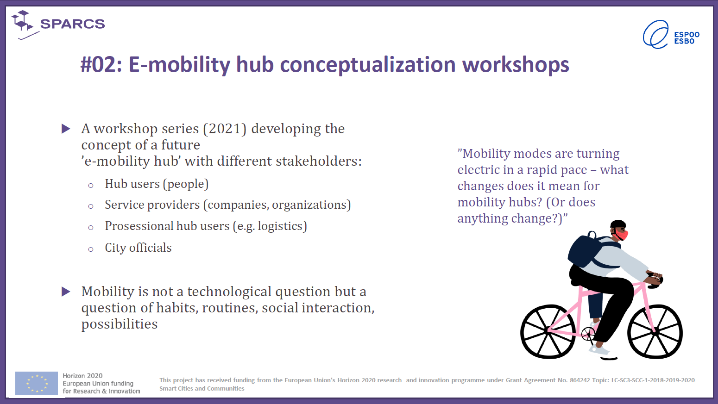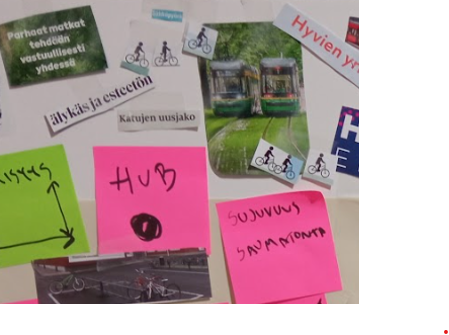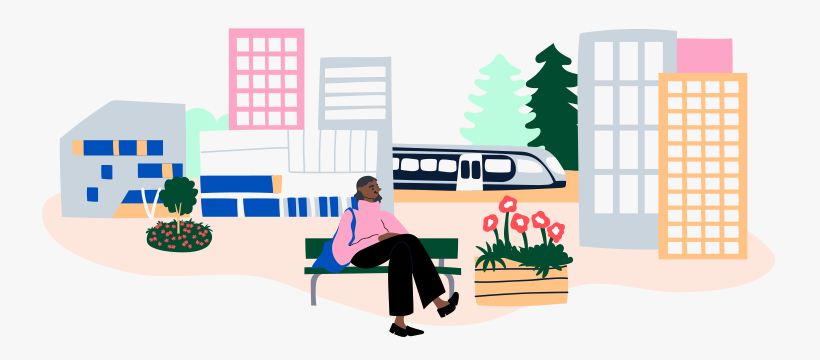Co-creation activities in Espoo: Disseminating learnings and Co-developing mobility hubs
SPARCS at the Finnish Urban Studies Days 2022
SPARCS was actively present at the yearly Finnish Urban Studies Days 2022 conference (http://www.kaupunkitutkimuksenpaivat.net/) in Tampere.
The City of Espoo together with Metropolia University of Applied Sciences organized a session in the conference with a tittle ‘Towards beautiful, sustainable and inclusive cities? The potential role(s) of art and creativity in leading transdisciplinary urban initiatives for sustainability’. The session gathered four presentations from Metropolia, Archinfo, Savonia University of Applied Sciences and the City of Espoo/SPARCS that presented different perspectives to development of cities and regions and the EU-level New European Bauhaus initiative.
Jani Tartia from ESP presented the work done in SPARCS on citizen engagement and co-creation of sustainable cities. The presentation highlighted three cases from SPARCS: Buddy Class activities, where themes of sustainable development and sustainable lifestyles are co-examined with upper secondary school students; A series of workshops where future concepts of e-mobility hubs have been developed together with different stakeholders; and The development of a co-creation model for smart and sustainable urban areas, which itself is co-created with different stakeholders during 2022.
The cases have provided learnings and insights both on the developed subject matters (sustainable development, cities, energy, mobility) as well as on the organization and facilitation of co-creation processes.

SPARCS and Finnish Lighthouse cities: A mobility hub workshop
The Finnish Lighthouse cities of Espoo, Helsinki, Tampere, Oulu and Turku, and their respective Lighthouse projects, co-planned and co-organized a mobility hub themed face-to-face co-working session in Tampere in April.
The idea was to gather together to work on a theme that had relevance in all the cities and to exchange ideas between the projects’ and cities’ mobility experts. Tampere took the main lead in organizing the event. In the session, the possible futures and necessary development points of mobility hubs were examined by experts and specialists from each city.
The session included first brief presentations on current mobility hub development in the cities. The cities had each prepared a ‘challenge’ regarding mobility hub development that were then worked on in small groups in a co-working session. Espoo’s SPARCS related challenge was presented as: ‘As different mobility modes are turning electric, what changes in the mobility hubs (or does anything change)?’. This challenge is closely linked with the work done in the Espoo demonstrations areas on e-mobility hub development – the new technologies related to e-mobility and the new ways of conducting mobility through shared services produce new practices, infrastructural requirements, spatial designs, and user experiences in the hub, either as planned transformations or as byproducts.
Other presented challenges in the session related to the utilization of data in the hub development, finding ways to provide support for market-based services in the hubs, and finding suitable lots and areas for future mobility hubs in densely built cities. The co-working session in small groups produced possible solutions and ideas related to each presented challenge, which were also presented and discussed together in the latter part of the event. The co-working session brought together around twenty specialists form the Lighthouse projects and cities. The learnings and insights from the event support the conceptualization of future urban mobility hubs and their challenges and opportunities.


